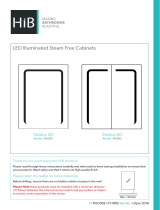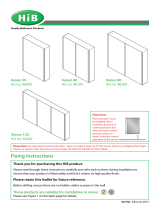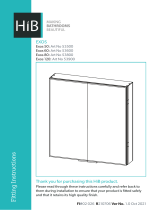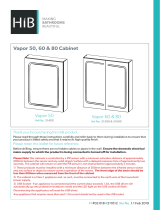
Thank you for purchasing this HiB product.
Please read through these instructions carefully and refer back to them during installation to ensure that
your product is tted safely and that it retains its high quality nish.
Please retain this leaet for future reference.
Before drilling, ensure there are no hidden cables or pipes in the wall. Ensure the domestic electrical
mains supply to which the cabinet is being connected is turned o.
Please Note You may need to remove the door / doors to aid installation.
This can be done by unclipping the hinges. (There is a release catch at the
back of the hinge). DO NOT FIT SHELVES AT THIS STAGE.
Please Note These products must be installed with a minimum distance of 150mm
between the infra-red sensor switch and any surface or object to ensure correct
operation of the sensor.
FI #02 007 R211012 Ver No. 3.1 AUG 2018
Qubic 50, 60, 80 &120:
Art No. 46400, 46500, 46600, 48000
Min. 150mm
Apex 50, 60, 80 & 100:
Art No. 47000, 47100, 47200 & 47300
Xenon 50, 60, 80, 100 & 120:
Art No. 46000, 46100, 46200, 46250 & 46300

2
Angle Adjustment
Claw In/Out
Adjustment
Claw In/Out
Adjustment
Fixing Preparation (Fig A)
Fixing Brackets (Fig B) Hanger Adjustment (Fig C)
Mounting Points
Location of internal
xing hole (SINGLE DOOR)
REAR VIEW
Location of internal
xing hole (DOUBLE DOOR)
Wall Hung Installation
Ensure the domestic electrical mains supply to
which the cabinet is being connected is turned
o.
1. Position the cabinet in a suitable location
(according to the zonal diagram (Fig 1) on
the back page) ensuring that the mains
supply cable is within reach of the cable
connection point of the cabinet. Carefully
mark the desired position of the cabinet
using a soft pencil, ensuring it is level.
2. Remove the cabinet from the wall and using
a spirit level, mark a horizontal line below
the pencil mark, taking into account the
location of the mounting points (Fig. A).
Place brackets on the line paying attention
to the distance between the hangers on the
cabinet. Carefully mark the position of the
holes using a soft pencil. (Fig. B).
3. Before drilling, ensure there are no hidden
cables or pipes behind the mounting point.
Using a suitable drill bit, drill holes in the
marked positions to a suitable depth.
4. Insert wall plugs level with the surface of the
wall. If tting to a tiled surface, wall plugs
should be inserted below the tile surface
to avoid cracking. NB. For plasterboard walls,
specialist xings should be purchased from any
DIY or hardware store.
5. Fix the brackets to the wall using the screws
provided.
6. Carefully remove the small screws along the
top front edge of the cabinet to gain access
to the internal panel(s). (Fig. C) Keep screws
in a safe place.
7. Temporarily hang the cabinet ensuring the
claws on the hangers are securely located on
the wall brackets. Using a spirit level adjust
the cabinet via the screws on the hangers.
(Fig. C).
8. Mark the position of the internal xing
hole(s) and remove the cabinet. Using a
suitable drill bit, drill the holes and insert the
wall plugs as per stage 4 above.
9. Connect the cable at the rear of the cabinet
to the mains supply cable using a suitable
terminal block (not supplied) according to
the wiring diagram (Fig. 2) on the back page.
10. Rehang the cabinet in position, tighten the
screws on the hangers (Fig. C) and secure the
base of the cabinet with the supplied screws
and screw caps.

hib.co.uk 3
Door Adjustment (Fig D)
Move door(s) up/down
Move door away/towards
the cabinet
Move door(s) left/right
11. Once fully secure, close the internal panel(s)
using the screws removed at stage 6.
12. Insert metal shelf supports in desired
position. Put glass shelf into shelf supports
and tighten the plastic grub screw whilst
holding the metal support. This will securely
clamp the shelf into position.
13. Re-attach the door(s) ensuring the hinges
fully locate and click back into position.
14. If necessary, the hinges can be adjusted in
order to reposition the door(s) (Fig.D).
15. Switch the mains supply back on.
Operating Instruction
This cabinet is tted with colour temperature
changing technology.
To switch on/o
Slowly move your hand past the sensor.
To change the colour temperature
1. To alter the colour temperature of the
cabinet, hold your hand underneath the
sensor, the colour temperature will start to
change.
2. Simply move your hand away from
the sensor when the desired colour
temperature has been reached and
continue to operate the cabinet as normal -
the chosen colour temperature will remain
even after power is switched o and on
again.
Move door(s) up/down
Move door away/towards
the cabinet
Move door(s) left/right
Move door(s) up/down
Move door away/towards
the cabinet
Move door(s) left/right
Charger socket(s) are suitable for charging
and powering electric razors, trimmers and
toothbrushes.
NB. On rst use of the charger socket, inserting the
plug may prove to be sti. Reasonable force may
be required to fully insert the plug. Make sure that
the cabinet is held rmly so that it is not pushed o
the wall. After a few uses, stiness will ease and the
socket will function as normal.

This product is suitable for installation in zones: 2 & Outside Zones
All installations must comply with guidelines which are based on a zonal concept. The diagram above
illustrates this concept and must be followed to ensure the safe installation of electrical appliances in the
bathroom. These regulations apply to domestic installations only. Installations must be made in accordance
with the current IEE wiring regulations and relevant building regulations. HiB recommends that all electrical
bathroom products should only be tted by a suitably qualied, Part P registered electrician.
©HiB Copyright: No part of this document may be reprinted or duplicated without HiB consent. All sizes and measurements are approximate, but we do try and
make sure they are as accurate as possible. In the interest of continuous product development, HiB reserves the right to alter specications as necessary. E & OE.
T: +44 (0)20 8441 0352 F: +44 (0)20 8441 0219 E: [email protected].uk hib.co.uk
Building 3, North London Business Park, Oakleigh Road South, New Southgate, London. N11 1GN
(Fig 1)
Wiring Diagram (Fig 2)
live
earth
neutral
MAINS SUPPLYLUMINAIRE
Live supply can be Red or Brown
Earth supply is Green and Yellow
Neutral supply can be Blue or Black
Live is Brown
Earth is Green and Yellow
Neutral is Blue
This product contains a light source of energy eciency class E
Electrical Safety Information
HiB recommends that all electrical bathroom products should only be tted by a suitably qualied, Part P
registered electrician in accordance with current IEE regulations. Ensure mains power supply is switched
o before starting installation. Before drilling, ensure there are no hidden cables or pipes in the wall.
Care Instructions
Do not use abrasives or solvents when cleaning this product.
Wipe o all water spillages as soon as possible using a soft, damp cloth.
Aftercare Service
In the unlikely event that this product should fail please contact HiB customer services, contact detail
shown below.
WEEE compliance
Must not be mixed with
general household waste
-
 1
1
-
 2
2
-
 3
3
-
 4
4
HiB Qubic Fitting Instructions
- Type
- Fitting Instructions
Ask a question and I''ll find the answer in the document
Finding information in a document is now easier with AI












